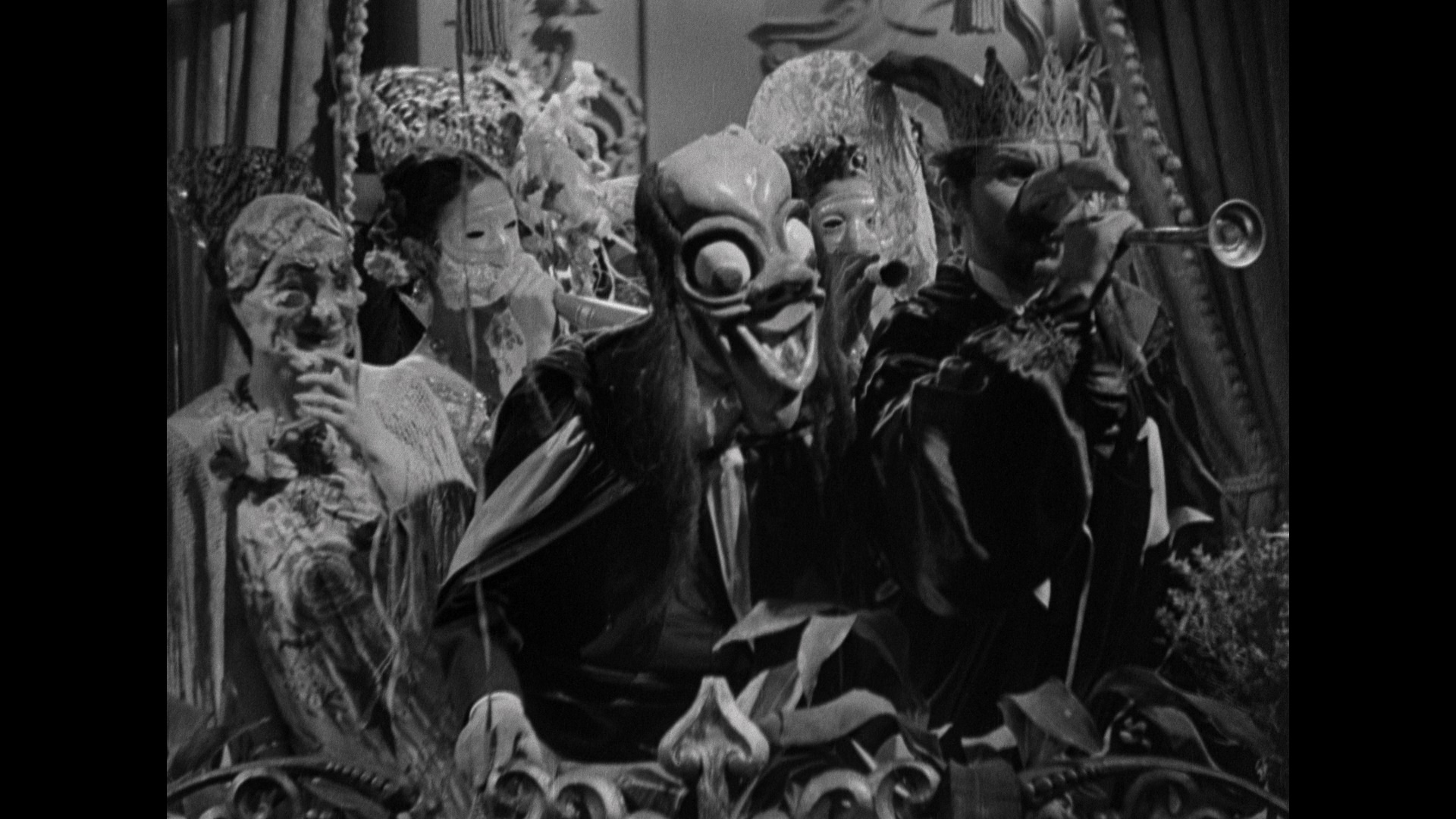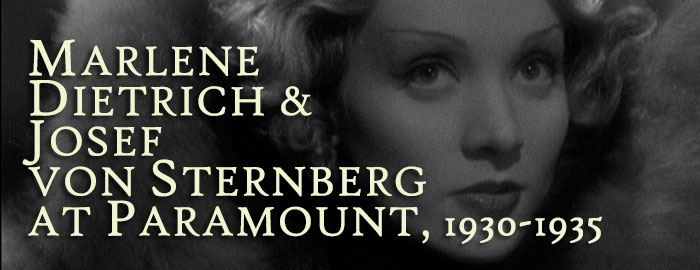
MOROCCO
B&W, 1930, 92 mins. 9 secs.
Directed by Josef von Sternberg
Starring Marlene Dietrich, Gary Cooper, Adolphe Menjou
DISHONORED
B&W, 1931, 91 mns. 27 secs.
Directed by Josef von Sternberg
Starring Marlene Dietrich, Victor McLaglen, Gustav von Seyffertitz, Warner Oland
Indicator (Blu-ray) (UK RB HD), Criterion (Blu-ray) (US RA HD), Universal (DVD) (US R0 NTSC), Turner Classic Movies (US R1 NTSC), Kinos (Italy R2 PAL)
SHANGHAI EXPRESS
B&W, 1932, 82 mins. 20 secs.
Directed by Josef von Sternberg
Starring Marlene Dietrich, Clive Brook, Warner Oland, Louise Closser, Anna May Wong
Indicator (Blu-ray) (UK RB HD), Criterion (Blu-ray) (US RA HD), Universal (DVD) (US R0 NTSC), Turner Classic Movies (US R1 NTSC), Kinos (Italy R2 PAL)
BLONDE VENUS
B&W, 1932, 94 mins. 2 secs.
Directed by Josef von Sternberg
Starring Marleen Dietrich, Herbert Marshall, Cary Grant, Dickie Moore
Indicator (Blu-ray) (UK RB HD), Criterion (Blu-ray) (US RA HD), Universal (DVD) (US R0 NTSC), Elephant Films (Blu-ray & DVD) (France R0 HD/PAL)
THE SCARLET EMPRESS
B&W, 1934, 104 mins. 49 secs.
Directed by Josef von Sternberg
Starring Marlene Dietrich, John Lodge, Sam Jaffe, Louise Dresser
Indicator (Blu-ray) (UK RB HD), Criterion (Blu-ray) (US RA HD), Universal (DVD) (US R0 NTSC)
THE DEVIL IS A WOMAN
B&W, 1935,
79 mins. 39 secs.
Directed by Josef von Sternberg
Starring Marlene Dietrich, Lionel Atwill, Edward Everett Horton, Alison Skipworth, Cesar Romero
Indicator (Blu-ray) (UK RB HD), Criterion (Blu-ray) (US RA HD), Universal (DVD) (US R0 NTSC)
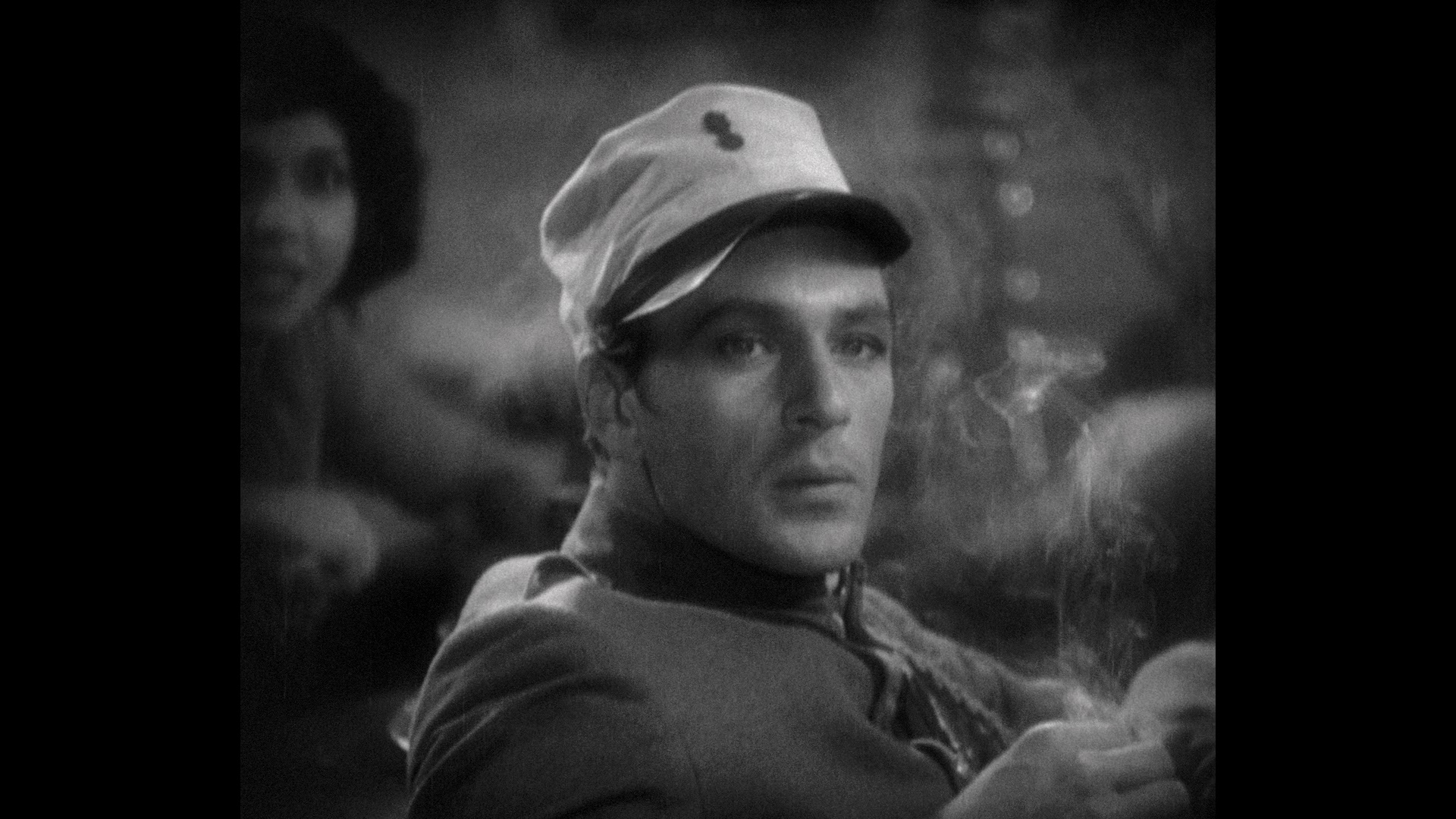 causing an international sensation
causing an international sensation 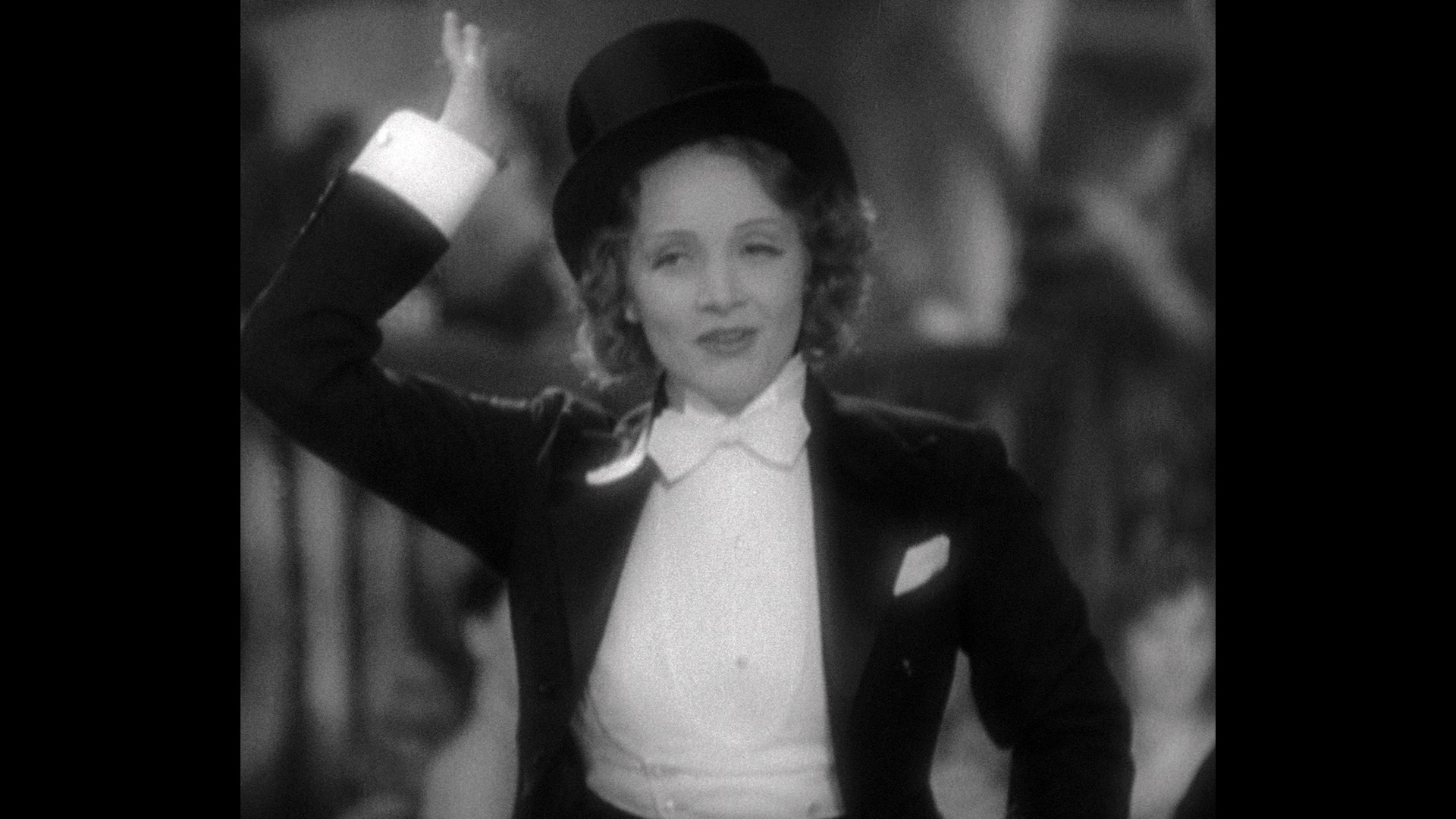 in The Blue Angel for director (and perceived Svengali) Josef von Sternberg, actress Marlene Dietrich headed off to Hollywood where the pair made six stylized, extravagant melodramas at Paramount unlike anything seen before or since in cinema. The very definition of a Pre-Code screen icon, Dietrich used her deadly combination of eye-catching legs and magnetic screen presence to create strong, fascinating women who didn't need a man to validate their existence.
in The Blue Angel for director (and perceived Svengali) Josef von Sternberg, actress Marlene Dietrich headed off to Hollywood where the pair made six stylized, extravagant melodramas at Paramount unlike anything seen before or since in cinema. The very definition of a Pre-Code screen icon, Dietrich used her deadly combination of eye-catching legs and magnetic screen presence to create strong, fascinating women who didn't need a man to validate their existence. 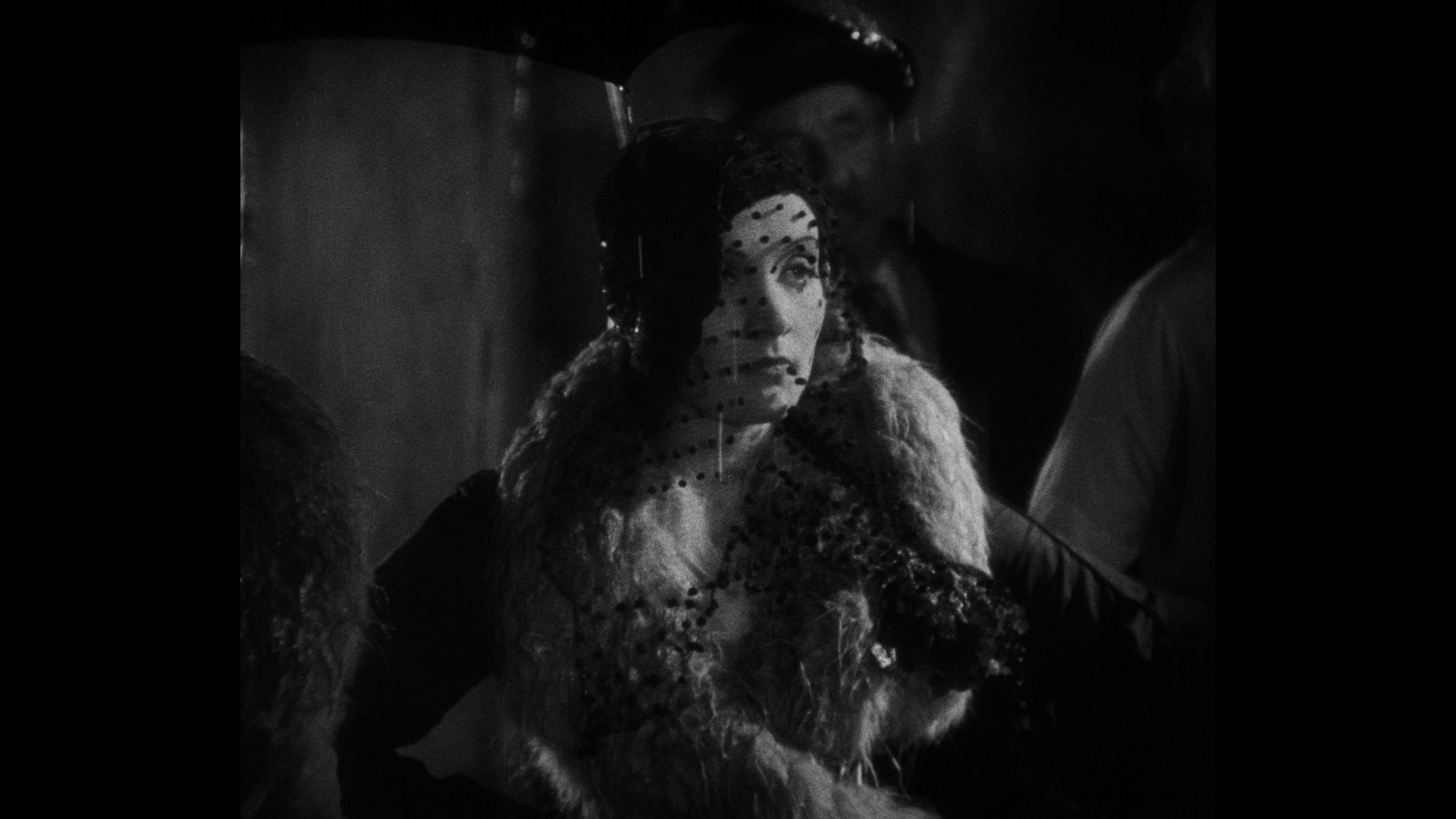 and champagne bottles. Here she's cast in 1915 Vienna as X27, an Austrian agent and former lady of the night previously known as the recently widowed Marie Kolverer.
and champagne bottles. Here she's cast in 1915 Vienna as X27, an Austrian agent and former lady of the night previously known as the recently widowed Marie Kolverer. 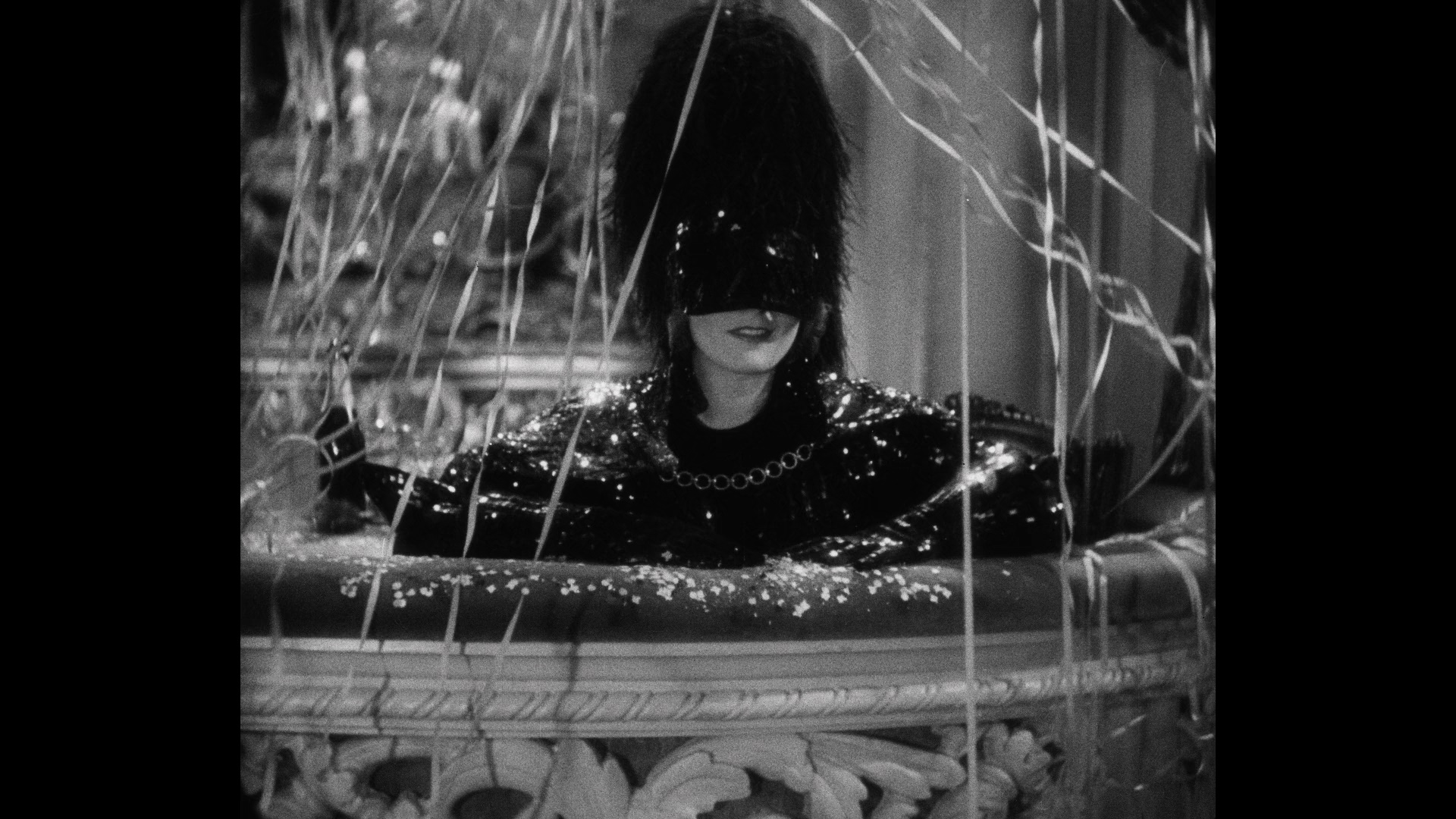 She's enlisted to get information from Russian lieutenant Kranau (McLaglen, who almost fades off the screen opposite his leading lady), after plying secrets from the formidable General Von Hindau (Oland).
She's enlisted to get information from Russian lieutenant Kranau (McLaglen, who almost fades off the screen opposite his leading lady), after plying secrets from the formidable General Von Hindau (Oland). 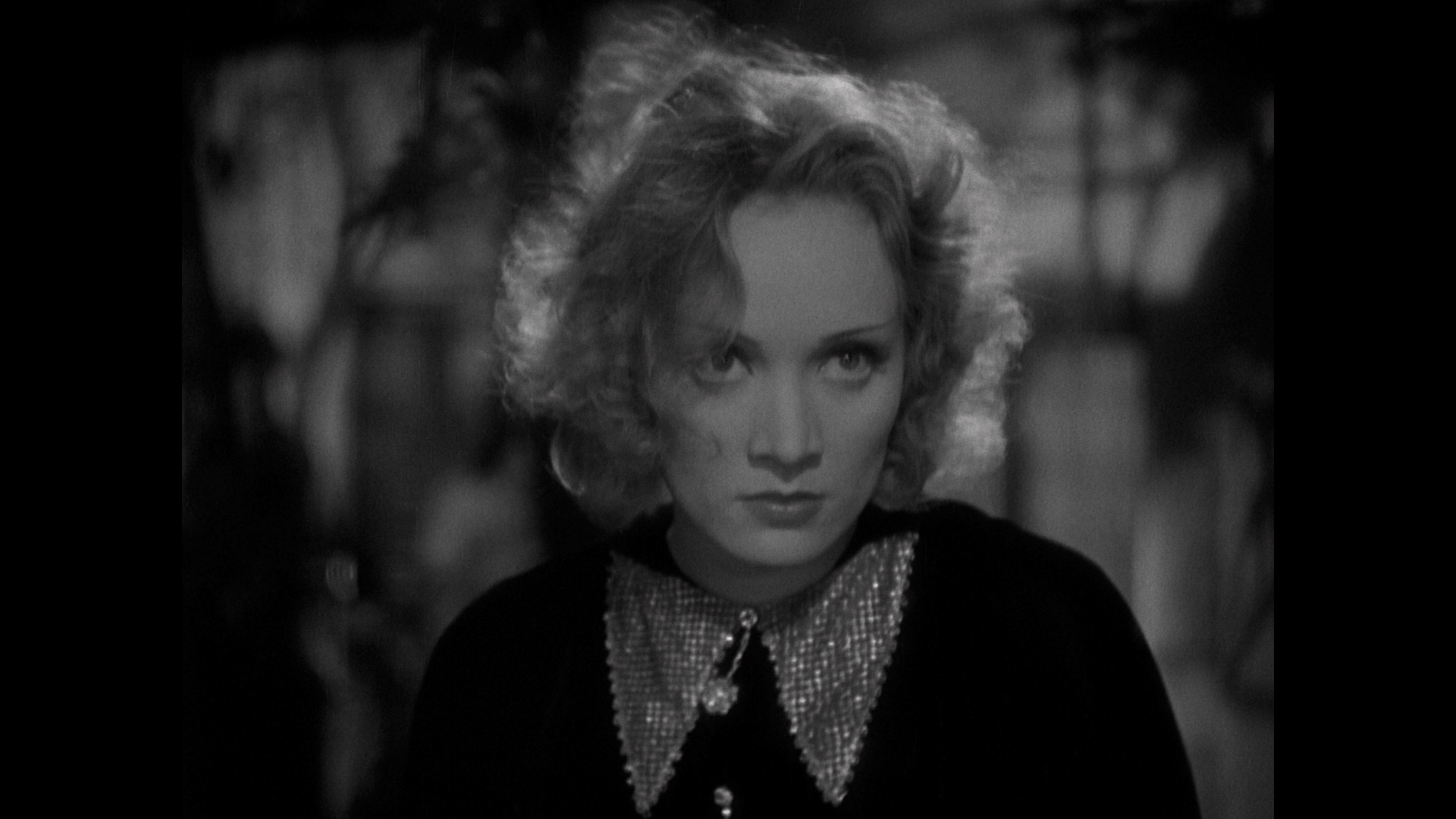 villains
villains 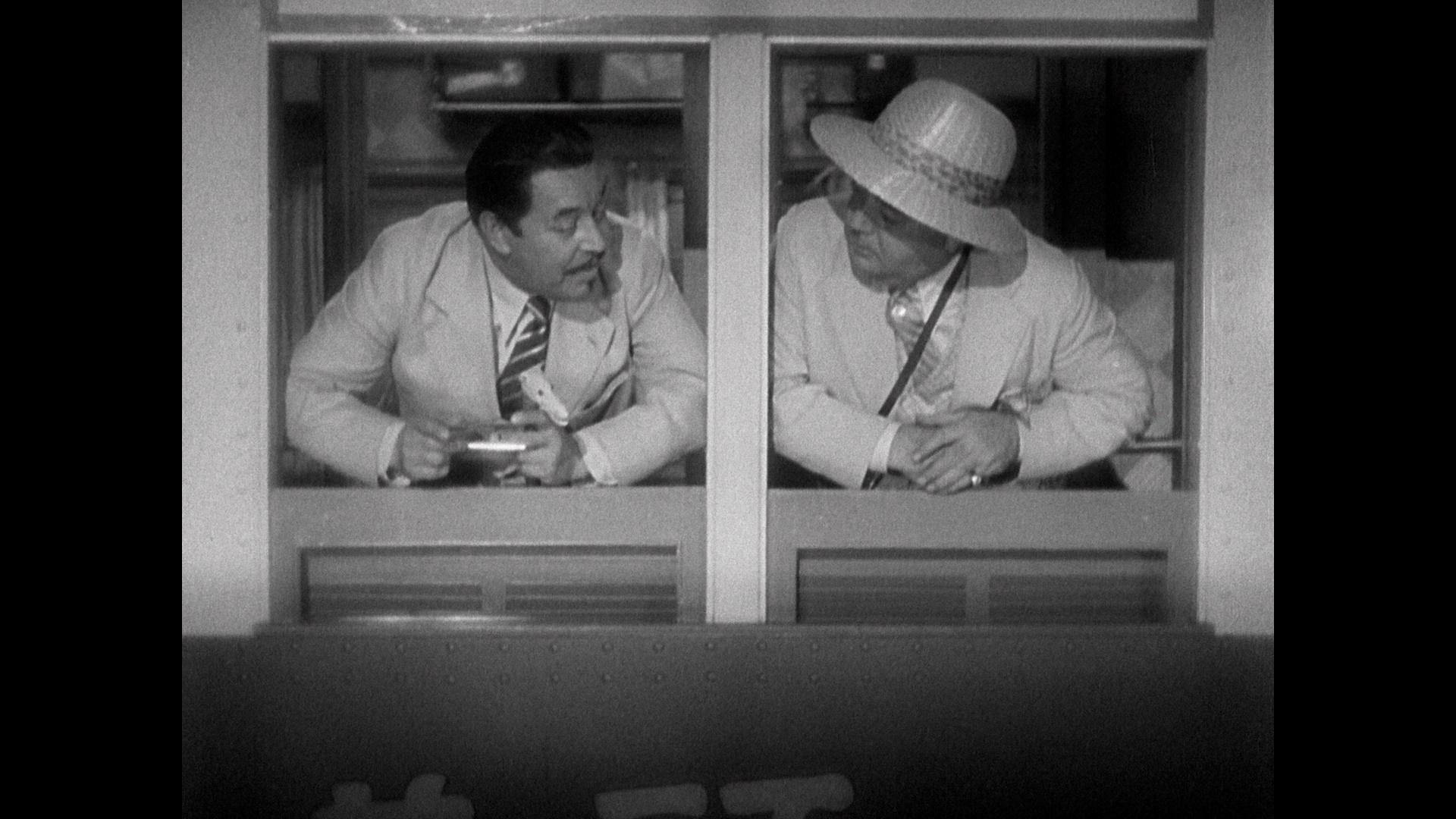 come calling? How many cigarettes can she sexily smoke in her carriage? And what about revenge-driven hooker Hui Fei (the always fascinating Wong), who has a sharp knife handy with Chang's name on it? Deliriously entertaining from start to finish, this film is the perhaps the most operatic and outrageous of Hollywood's "exotic" fetish for all things Eastern during the 1930s. It has some stiff competition from the likes of The Mask of Fu Manchu, of course, but this one pushes its soap opera plot into alien terrain more like a string of fetishistic odes to its leading lady than a woman-in-peril story. It's all executed with great visual style by von Sternberg, who knew how to execute a believable crowd scene and light his star with equal skill; he later tried to pull off a similar trick with The Shanghai Gesture and instead created one of the greatest camp classics in movie history. There's nothing camp about this film though; it knows exactly what it is and only expects you to laugh when it wants you to.
come calling? How many cigarettes can she sexily smoke in her carriage? And what about revenge-driven hooker Hui Fei (the always fascinating Wong), who has a sharp knife handy with Chang's name on it? Deliriously entertaining from start to finish, this film is the perhaps the most operatic and outrageous of Hollywood's "exotic" fetish for all things Eastern during the 1930s. It has some stiff competition from the likes of The Mask of Fu Manchu, of course, but this one pushes its soap opera plot into alien terrain more like a string of fetishistic odes to its leading lady than a woman-in-peril story. It's all executed with great visual style by von Sternberg, who knew how to execute a believable crowd scene and light his star with equal skill; he later tried to pull off a similar trick with The Shanghai Gesture and instead created one of the greatest camp classics in movie history. There's nothing camp about this film though; it knows exactly what it is and only expects you to laugh when it wants you to.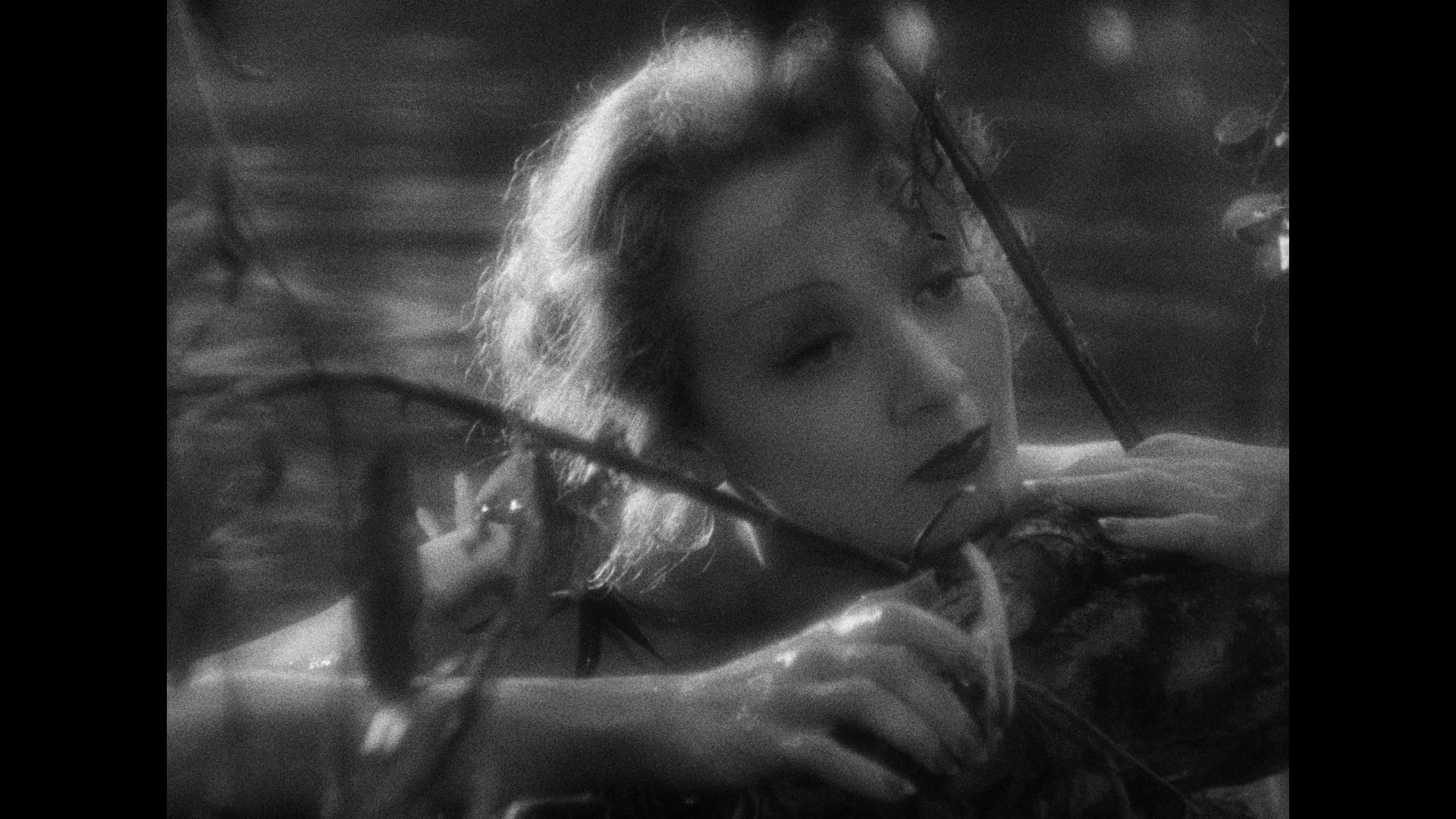 German singer who first
German singer who first 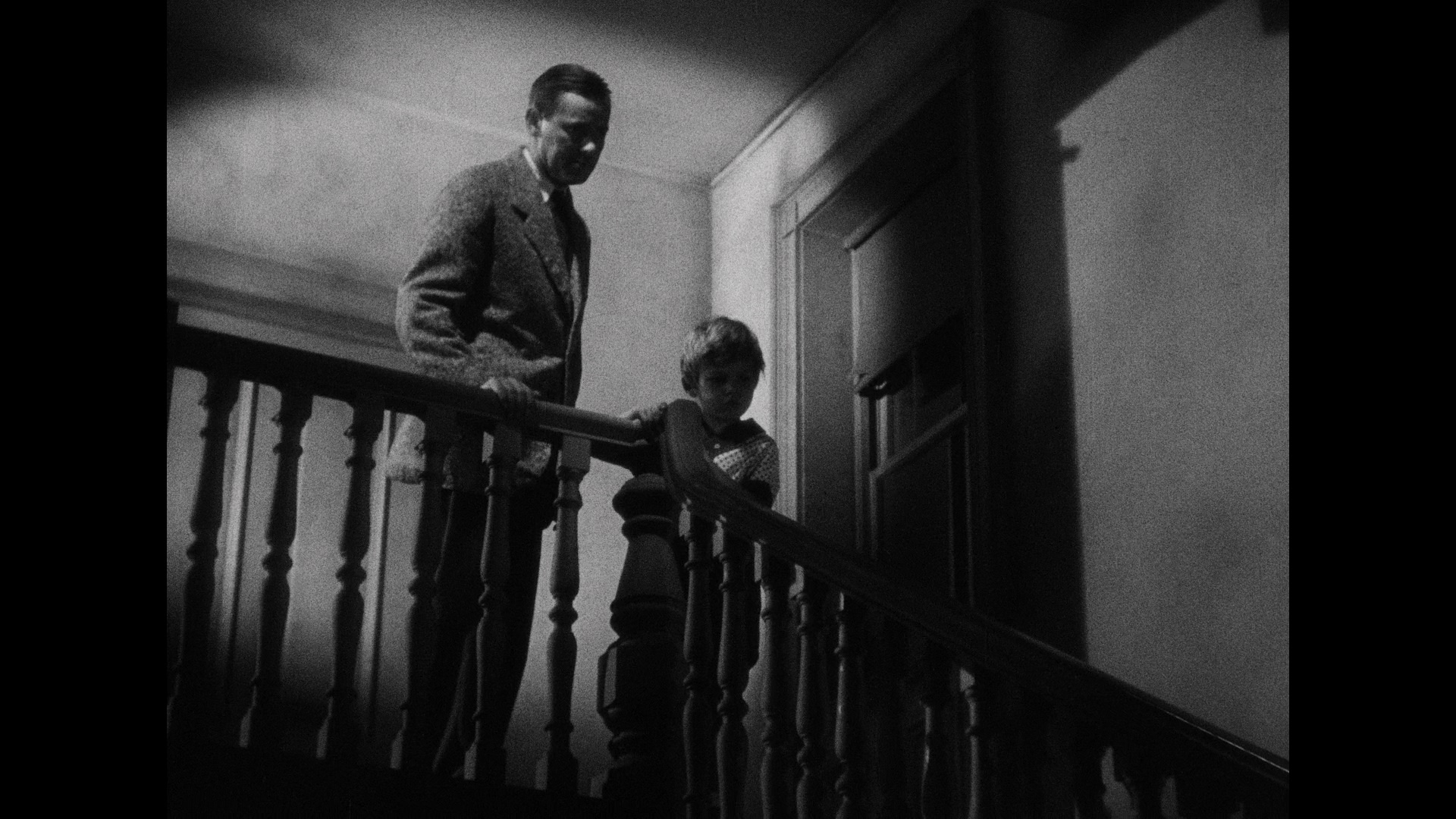 meets visiting American student Ned (Marshall) while skinny dipping with several of her friends. Years later they're married, he's a scientist, and they have a son, Johnny (Moore), but tragedy strikes when Ned develops radiation poisoning and has only one hope, an expensive experimental treatment in Europe. To pay for him and ensure the welfare of her family, Helen courts the financial favors of suave young millionaire Nick Townsend (Grant), a decision that sends her spiraling into the lower levels of society and testing the strength of her maternal instinct to the breaking point. Featuring one of Dietrich's most fascinating and multi-layered performances, this film still packs a number of surprises along the way including an ending that bucks expectations by not heading in the traditional tragic direction one would normally expect in Hollywood, but that's as much as can be said without ruining it. Of course, the entire film is completely overshadowed in film history by the startling "Hot Voodoo" number featuring Dietrich frugging in a gorilla suit and a gigantic chalk-white wig, a number that toys with African cultural signifiers of the time in a way that's wild, self-aware, and parodic enough to avoid the racism stigma that sticks to many musical numbers of the era. As usual the men take a back seat to Dietrich throughout, but it's interesting to see Grant playing his young, unformed persona opposite Dietrich so soon after shooting to
meets visiting American student Ned (Marshall) while skinny dipping with several of her friends. Years later they're married, he's a scientist, and they have a son, Johnny (Moore), but tragedy strikes when Ned develops radiation poisoning and has only one hope, an expensive experimental treatment in Europe. To pay for him and ensure the welfare of her family, Helen courts the financial favors of suave young millionaire Nick Townsend (Grant), a decision that sends her spiraling into the lower levels of society and testing the strength of her maternal instinct to the breaking point. Featuring one of Dietrich's most fascinating and multi-layered performances, this film still packs a number of surprises along the way including an ending that bucks expectations by not heading in the traditional tragic direction one would normally expect in Hollywood, but that's as much as can be said without ruining it. Of course, the entire film is completely overshadowed in film history by the startling "Hot Voodoo" number featuring Dietrich frugging in a gorilla suit and a gigantic chalk-white wig, a number that toys with African cultural signifiers of the time in a way that's wild, self-aware, and parodic enough to avoid the racism stigma that sticks to many musical numbers of the era. As usual the men take a back seat to Dietrich throughout, but it's interesting to see Grant playing his young, unformed persona opposite Dietrich so soon after shooting to 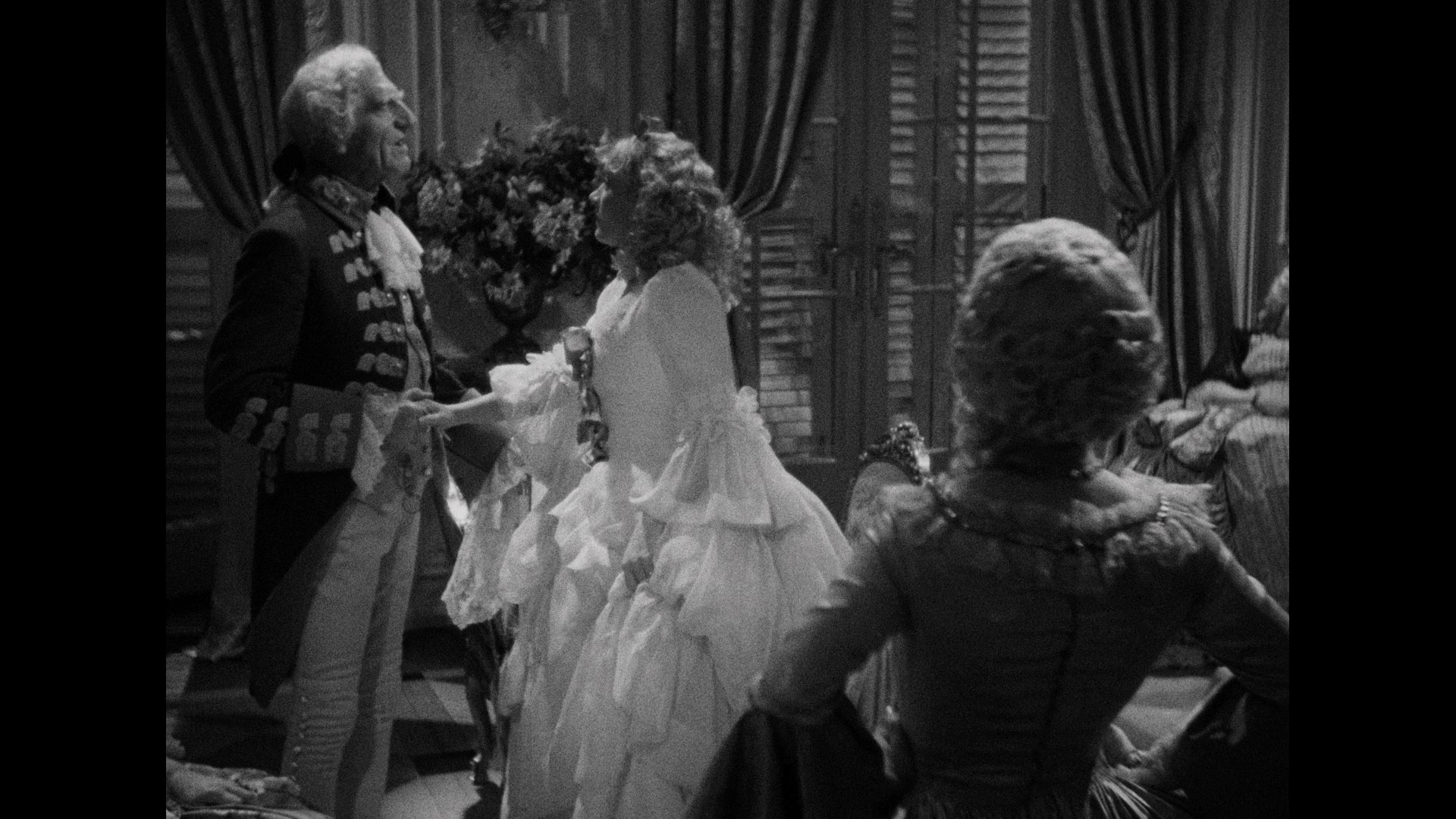 prominence opposite another fierce star, Mae West.
prominence opposite another fierce star, Mae West. 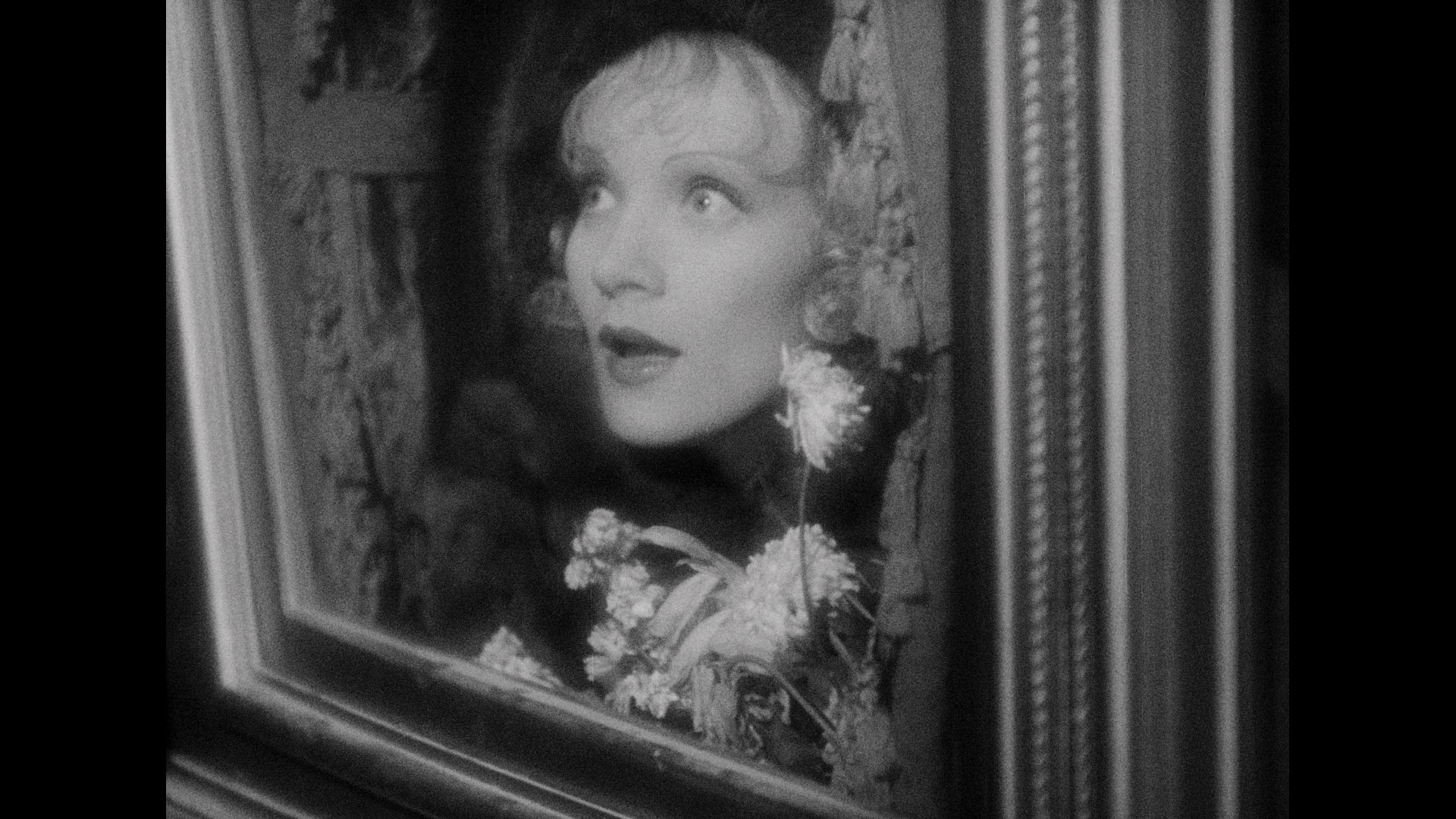 reached its visual climax with one of the most opulent and outrageous Hollywood epics of the era, The Scarlet Empress, a loose, eye-filling adaptation of the diaries of Catherine the Great. Dietrich stars as the wide-eyed young Sophia, who is selected by Russia's imperious Empress Elizabeth (Dresser) to marry her mad, idiot nephew, Grand Duke Peter (Jaffe), and bear him a son. Renamed Catherine, the new bride is far more attracted to Count Alexei (Lodge) whose inability to commit to her results in a notorious string of affairs and political maneuvers that will earn her a notorious place in the world's history books forever. Loaded with luxurious set, costumes, and edgy touches like an image of topless women being tortured and a man strung up and thrown around inside a giant bell, this is a Pre-Code film in spirit all the way even if it technically slipped in just after the transition, somehow with all of its lavish excesses intact.
reached its visual climax with one of the most opulent and outrageous Hollywood epics of the era, The Scarlet Empress, a loose, eye-filling adaptation of the diaries of Catherine the Great. Dietrich stars as the wide-eyed young Sophia, who is selected by Russia's imperious Empress Elizabeth (Dresser) to marry her mad, idiot nephew, Grand Duke Peter (Jaffe), and bear him a son. Renamed Catherine, the new bride is far more attracted to Count Alexei (Lodge) whose inability to commit to her results in a notorious string of affairs and political maneuvers that will earn her a notorious place in the world's history books forever. Loaded with luxurious set, costumes, and edgy touches like an image of topless women being tortured and a man strung up and thrown around inside a giant bell, this is a Pre-Code film in spirit all the way even if it technically slipped in just after the transition, somehow with all of its lavish excesses intact. 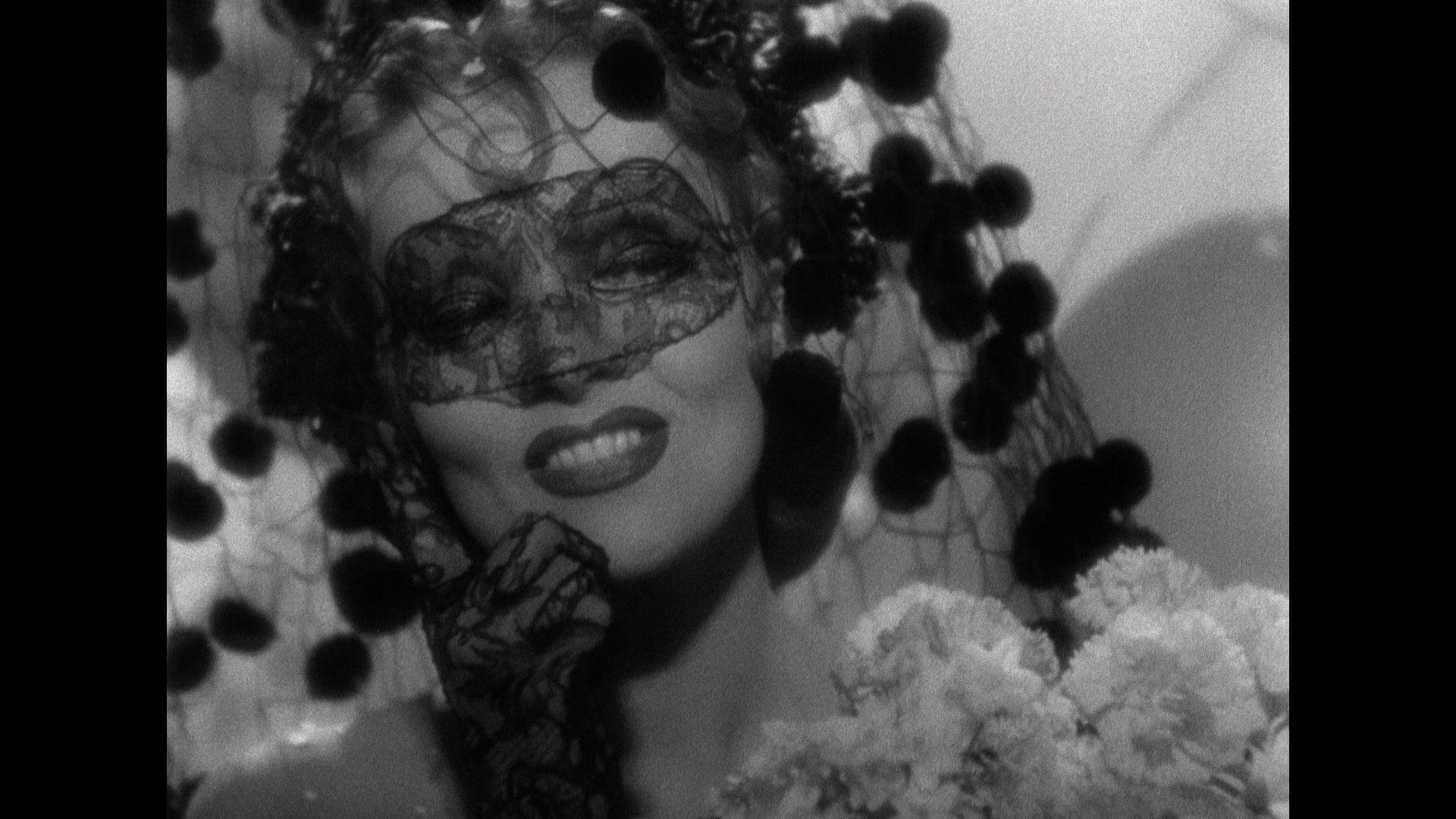 Finally after a pairing that burned brightly for a small number of years, the Dietrich and von Sternberg pairing came to end with 1936's The Devil Is a Woman, a farewell to the opulent couple with Dietrich set to embark on a wider range of projects
Finally after a pairing that burned brightly for a small number of years, the Dietrich and von Sternberg pairing came to end with 1936's The Devil Is a Woman, a farewell to the opulent couple with Dietrich set to embark on a wider range of projects 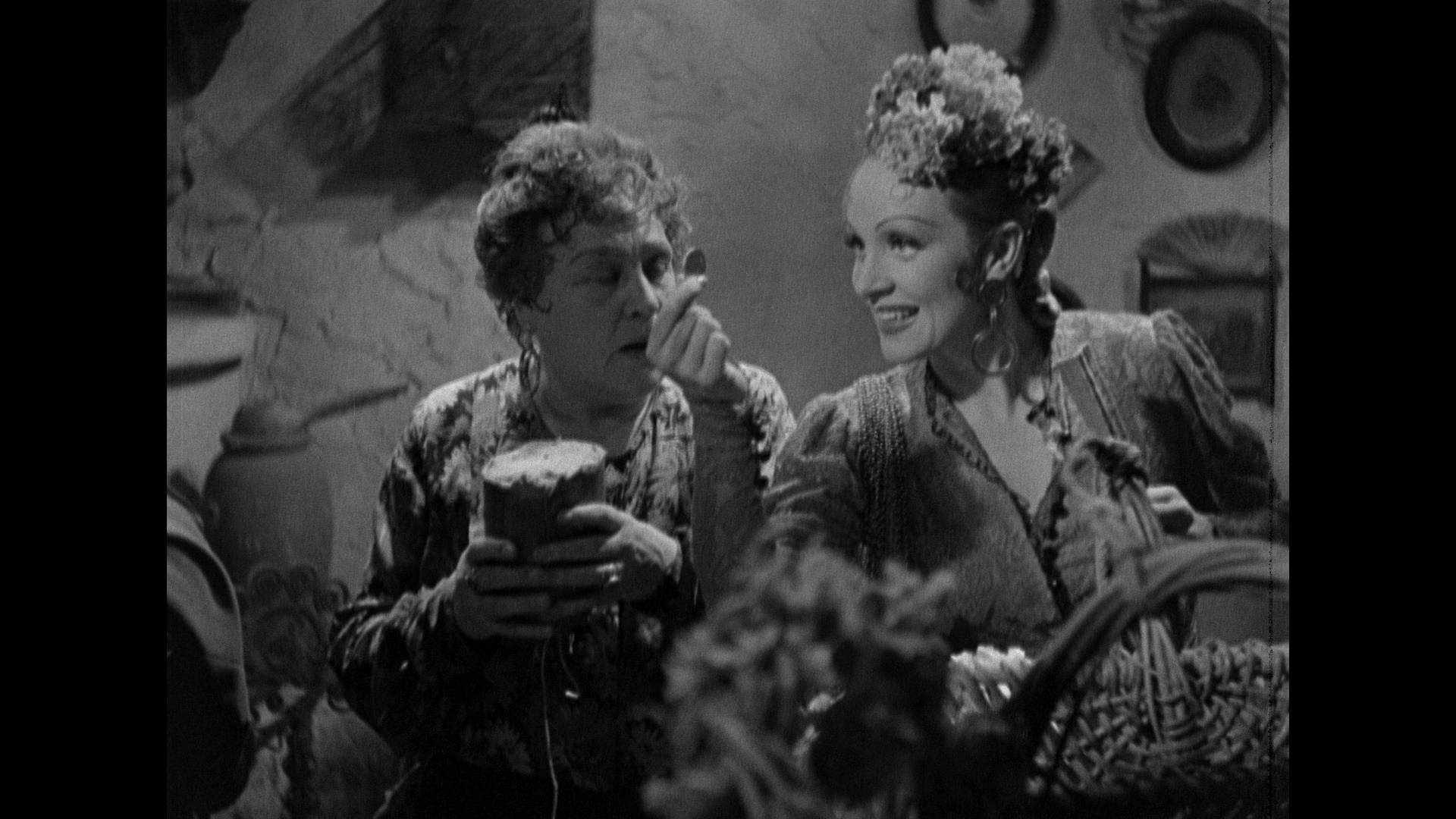 including comedies and westerns. Based on Pierre Louys' The Woman and the Puppet (which also inspired Luis Buñuel's final film, That Obscure Object of Desire), this one finds von Sternberg indulging in his fondness for masks and party theatrics by tackling a story set at carnival time in early 20th-century Spain. Don Pasqual (Atwill) has expressed vocal disgust with the presence of the beautiful and alluring Concha Perez (Dietrich), and in flashbacks we find out how his life was torn apart piece by piece thanks to his romantic entanglements with her. Nicknamed "Pasqualito," he gets turned into a humiliated wreck as an example to his friend Antonio (Romero), who is nevertheless drawn to her alluring presence. Though the plot is threadbare, von Sternberg still turns this into a visual smörgåsbord with a parade of inventive visual ideas that make the scant running time (less than 80 minutes) fly by even as a simple visual showcase for Dietrich's presence. The fact that this was mounted entirely after the inauguration of the Hays Code means it's also the mildest of the cycle, this time with unusually masochistic male figures caught in the wake of Dietrich's beguiling and disarmingly cheerful romantic bulldozer.
including comedies and westerns. Based on Pierre Louys' The Woman and the Puppet (which also inspired Luis Buñuel's final film, That Obscure Object of Desire), this one finds von Sternberg indulging in his fondness for masks and party theatrics by tackling a story set at carnival time in early 20th-century Spain. Don Pasqual (Atwill) has expressed vocal disgust with the presence of the beautiful and alluring Concha Perez (Dietrich), and in flashbacks we find out how his life was torn apart piece by piece thanks to his romantic entanglements with her. Nicknamed "Pasqualito," he gets turned into a humiliated wreck as an example to his friend Antonio (Romero), who is nevertheless drawn to her alluring presence. Though the plot is threadbare, von Sternberg still turns this into a visual smörgåsbord with a parade of inventive visual ideas that make the scant running time (less than 80 minutes) fly by even as a simple visual showcase for Dietrich's presence. The fact that this was mounted entirely after the inauguration of the Hays Code means it's also the mildest of the cycle, this time with unusually masochistic male figures caught in the wake of Dietrich's beguiling and disarmingly cheerful romantic bulldozer. 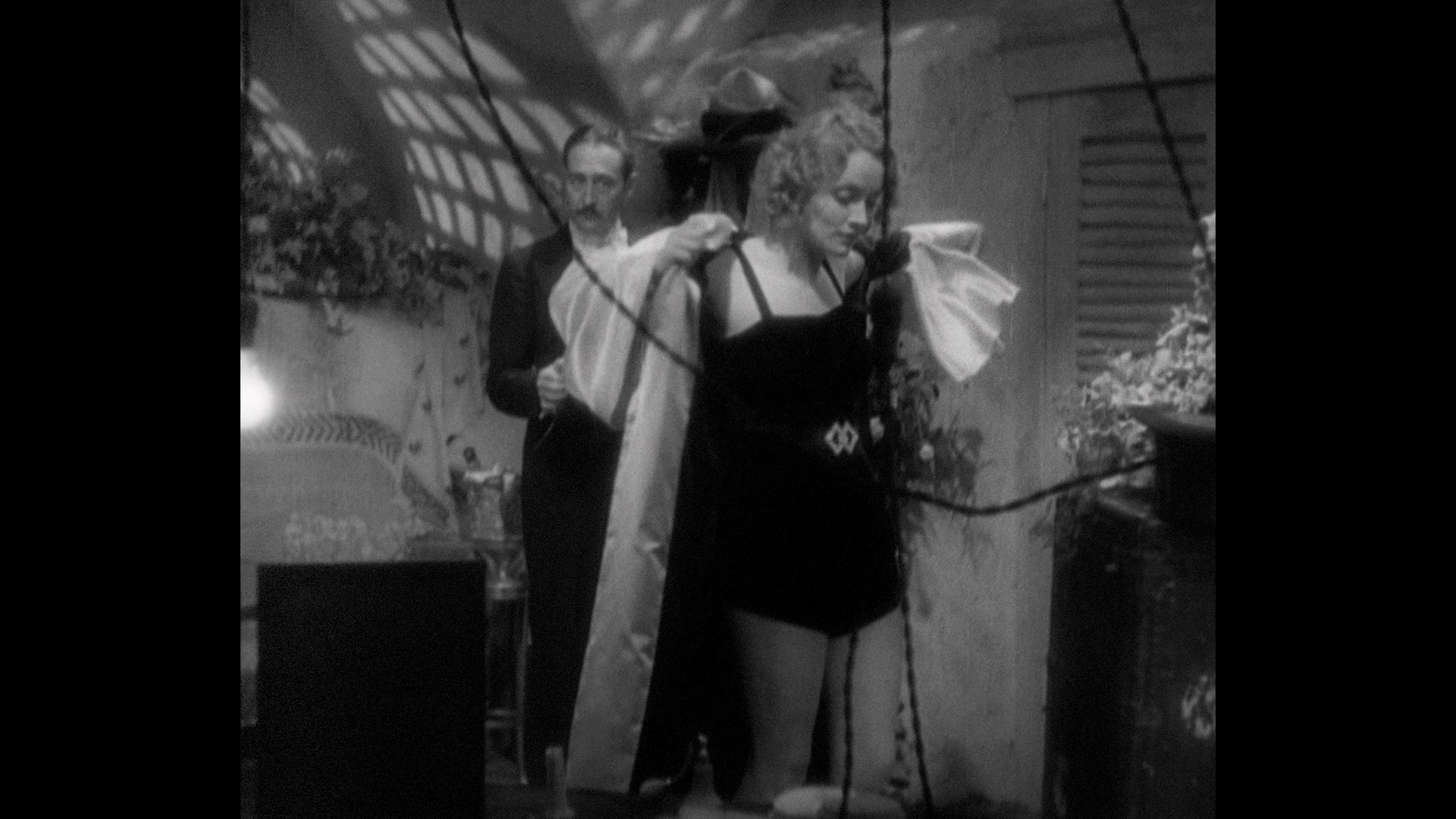 For some reason Universal
For some reason Universal 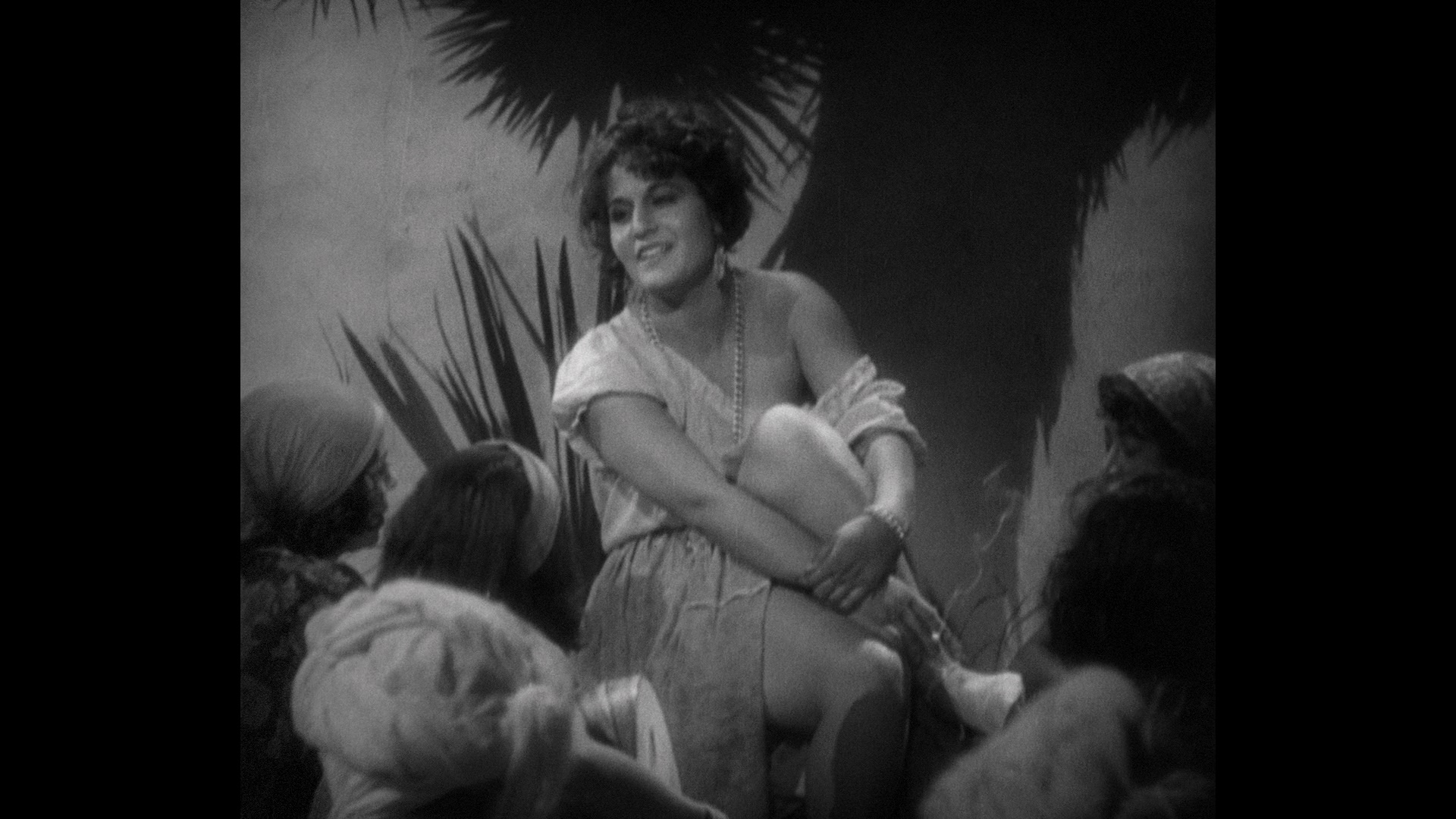 treated Shanghai Express and Dishonored with great indifference for many years on DVD, allowing some lackluster imports to trickle out here and there with dull transfers barely better than old VHS copies. In fact, they weren't even deemed worthy of inclusion in the studio's otherwise solid 2006 Marlene Dietrich: The Glamour Collection (though that also dropped other key titles like Desire and A Foreign Affair), which featured Morocco, Blonde Venus, and The Devil Is a Woman in in reasonably good transfers (with The Scarlet Empress given a standalone DVD release featuring a Jack Smith tribute and the 1996 BBC documentary The World of Josef von Sternberg). In any case, both titles were first brought back into U.S. digital circulation from Turner Classic Movies in a handy actress/director double feature salute in 2012. The transfer looks very similar to the new prints circulated in the early 2000s; there's some damage and softness here (not surprising given the fate of most Paramount films from that period), but it's quite nice overall with its all-important gray scales looking rich and velvety. Extras include galleries of lobby cards, production and promotional photos, and other visual ephemera. Dishonored also features separate galleries of lobby cards, posters, production shots, and some exceptionally good promotional images of Dietrich and the rest of the cast, but the best extra may be the TCMdb article about both films included as a step-through extra covering the complex relationship between the star and director during these pivotal early films.
treated Shanghai Express and Dishonored with great indifference for many years on DVD, allowing some lackluster imports to trickle out here and there with dull transfers barely better than old VHS copies. In fact, they weren't even deemed worthy of inclusion in the studio's otherwise solid 2006 Marlene Dietrich: The Glamour Collection (though that also dropped other key titles like Desire and A Foreign Affair), which featured Morocco, Blonde Venus, and The Devil Is a Woman in in reasonably good transfers (with The Scarlet Empress given a standalone DVD release featuring a Jack Smith tribute and the 1996 BBC documentary The World of Josef von Sternberg). In any case, both titles were first brought back into U.S. digital circulation from Turner Classic Movies in a handy actress/director double feature salute in 2012. The transfer looks very similar to the new prints circulated in the early 2000s; there's some damage and softness here (not surprising given the fate of most Paramount films from that period), but it's quite nice overall with its all-important gray scales looking rich and velvety. Extras include galleries of lobby cards, production and promotional photos, and other visual ephemera. Dishonored also features separate galleries of lobby cards, posters, production shots, and some exceptionally good promotional images of Dietrich and the rest of the cast, but the best extra may be the TCMdb article about both films included as a step-through extra covering the complex relationship between the star and director during these pivotal early films.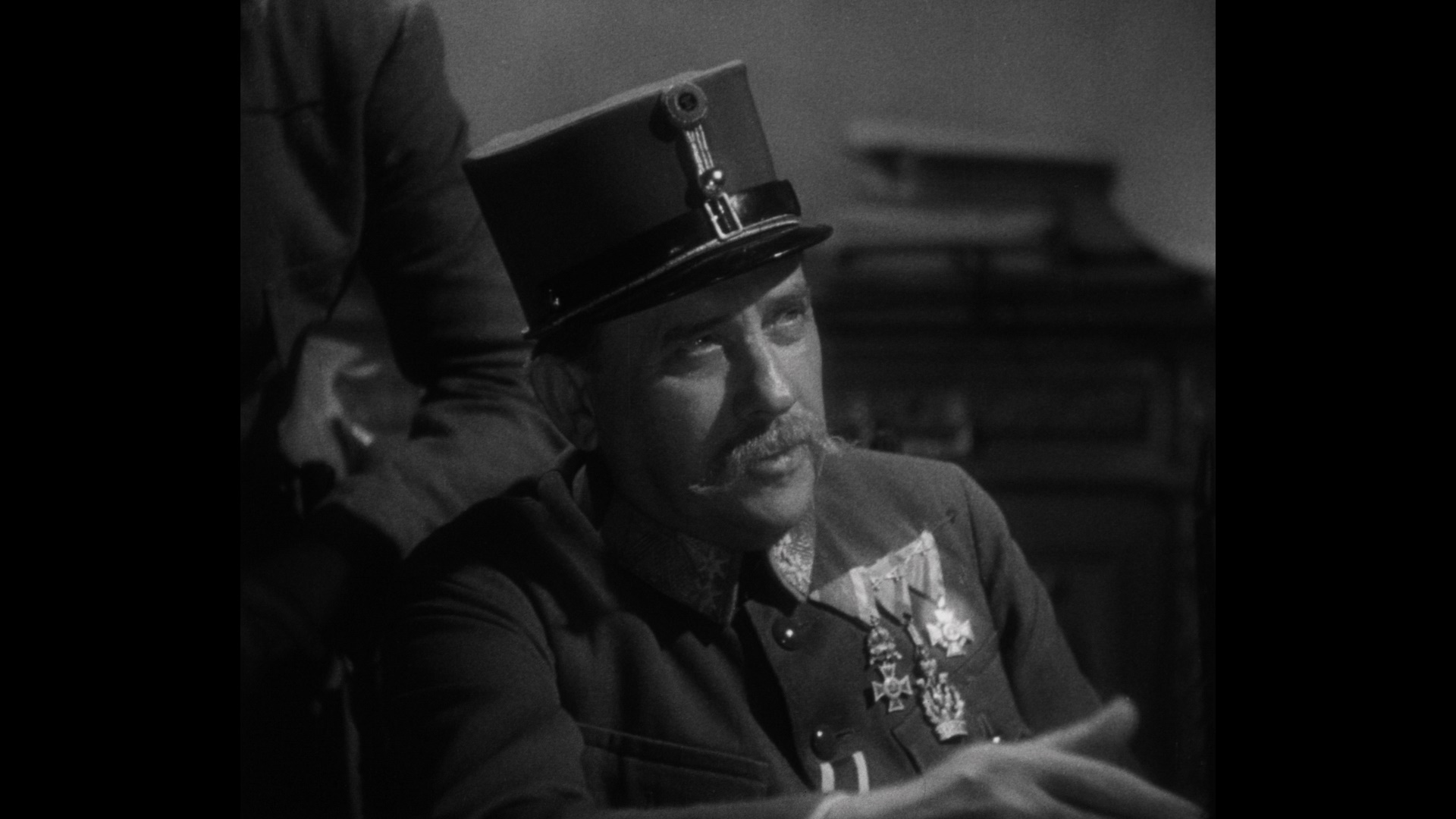 Dietrich reprising her role, this time opposite Clark Gable. "Weimar on the Pacific" (29m10s) is a new featurette with Gerd Gemünden and Noah Isenberg about Dietrich's orchestrated Hollywood invasion; film scholar Janet Bergstrom offers her own take on the film in a 2014 video interview (31m9s) created by Fiction Factory; and Deutsche Kinemathek curator Silke Ronneburg touches on the film's real-life inspiration in "The Real Amy Jolly" (4m33s). Dishonored comes with a 2018 "Dietrich Icon" featurette (21m31s) with Mary Desjardins, Amy Lawrence, and Patricia White, a "Bodies and Spaces, Fabric and Light" (29m17s) video essay by Cristina Álvarez López and Adrian Martin about von Sternberg's cinematic style, and an interview with the director's son, Dolemite cinematographer Nicholas von Sternberg (14m50s), about his memories of his father's Hollywood career. Weirdly, Shanghai Express only merits one extra, a 2018 featurette with film scholar Homay King (25m13s) about the film's exoticized depiction of China (a country von Sternberg never visited) and the use of Anna May Wong. For Blonde Venus, Ronneburg turns up again for an in-depth look at Dietrich's own personal collection of her memorabilia (14m43s), which thankfully remained in Berlin despite a higher offer that would have sent it disappearing into the desert. Costume designer Deborah Nadoolman Landis surveys the work and impact of regular Dietrich costume designer Travis Baton in a new featurette (15m2s), and 1935's "The Fashion Side of Hollywood" (10m24s) is a stylish theatrical short with Dietrich, Joan Bennett, Carole Lombard, and Banton among others showing off a peek at Paramount's striking fashion designs for its current roster of releases, with Dietrich posing in some of her amazing
Dietrich reprising her role, this time opposite Clark Gable. "Weimar on the Pacific" (29m10s) is a new featurette with Gerd Gemünden and Noah Isenberg about Dietrich's orchestrated Hollywood invasion; film scholar Janet Bergstrom offers her own take on the film in a 2014 video interview (31m9s) created by Fiction Factory; and Deutsche Kinemathek curator Silke Ronneburg touches on the film's real-life inspiration in "The Real Amy Jolly" (4m33s). Dishonored comes with a 2018 "Dietrich Icon" featurette (21m31s) with Mary Desjardins, Amy Lawrence, and Patricia White, a "Bodies and Spaces, Fabric and Light" (29m17s) video essay by Cristina Álvarez López and Adrian Martin about von Sternberg's cinematic style, and an interview with the director's son, Dolemite cinematographer Nicholas von Sternberg (14m50s), about his memories of his father's Hollywood career. Weirdly, Shanghai Express only merits one extra, a 2018 featurette with film scholar Homay King (25m13s) about the film's exoticized depiction of China (a country von Sternberg never visited) and the use of Anna May Wong. For Blonde Venus, Ronneburg turns up again for an in-depth look at Dietrich's own personal collection of her memorabilia (14m43s), which thankfully remained in Berlin despite a higher offer that would have sent it disappearing into the desert. Costume designer Deborah Nadoolman Landis surveys the work and impact of regular Dietrich costume designer Travis Baton in a new featurette (15m2s), and 1935's "The Fashion Side of Hollywood" (10m24s) is a stylish theatrical short with Dietrich, Joan Bennett, Carole Lombard, and Banton among others showing off a peek at Paramount's striking fashion designs for its current roster of releases, with Dietrich posing in some of her amazing 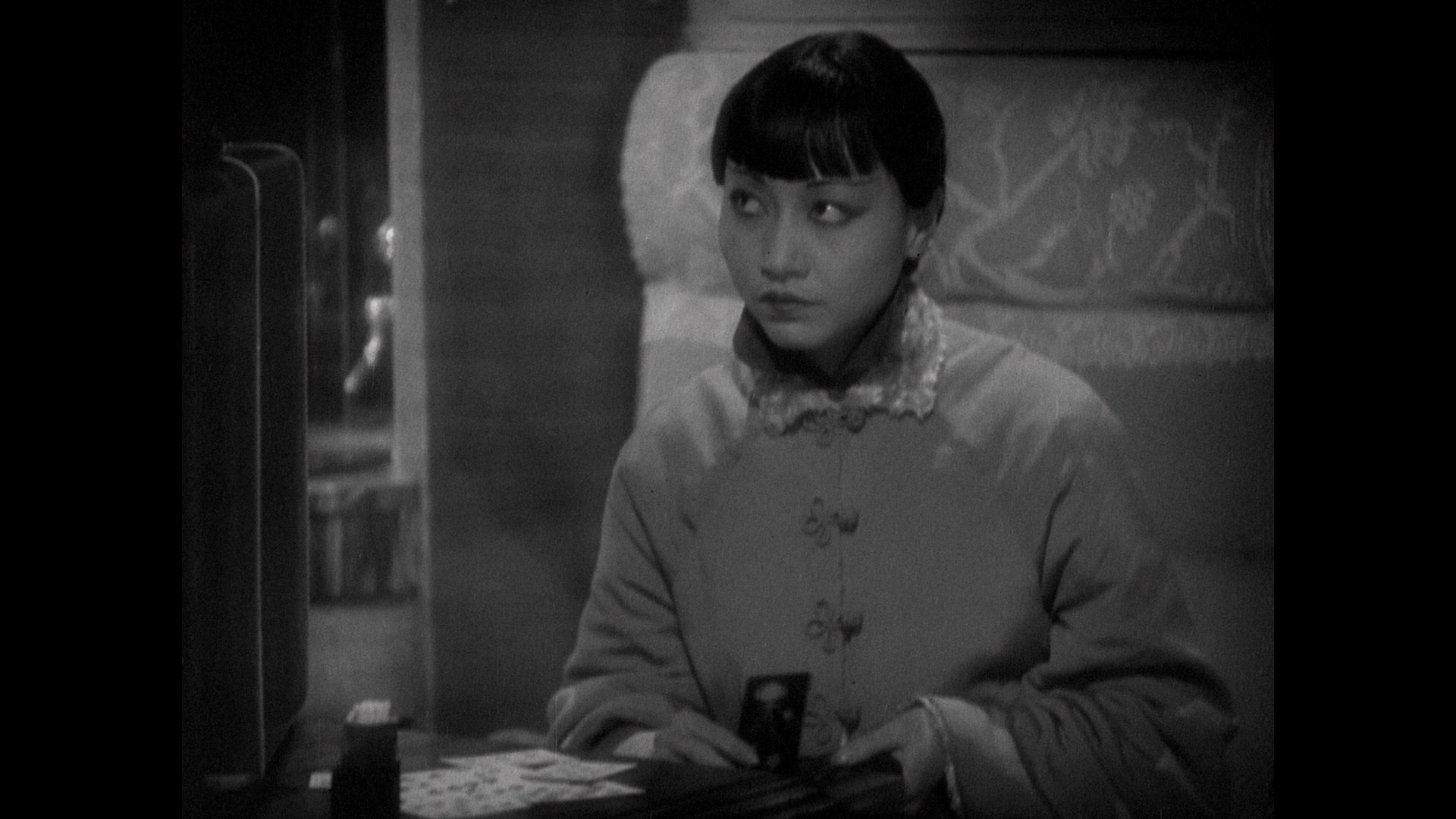 costumes in a very different setting. Also, you've never heard "yellow chiffon" pronounced quite this way anywhere else. The Scarlet Empress also gets skimped on a bit with only one extra, a 1971 interview with Dietrich in Copenhagen for Swedish TV (28m27s) with extensive
costumes in a very different setting. Also, you've never heard "yellow chiffon" pronounced quite this way anywhere else. The Scarlet Empress also gets skimped on a bit with only one extra, a 1971 interview with Dietrich in Copenhagen for Swedish TV (28m27s) with extensive 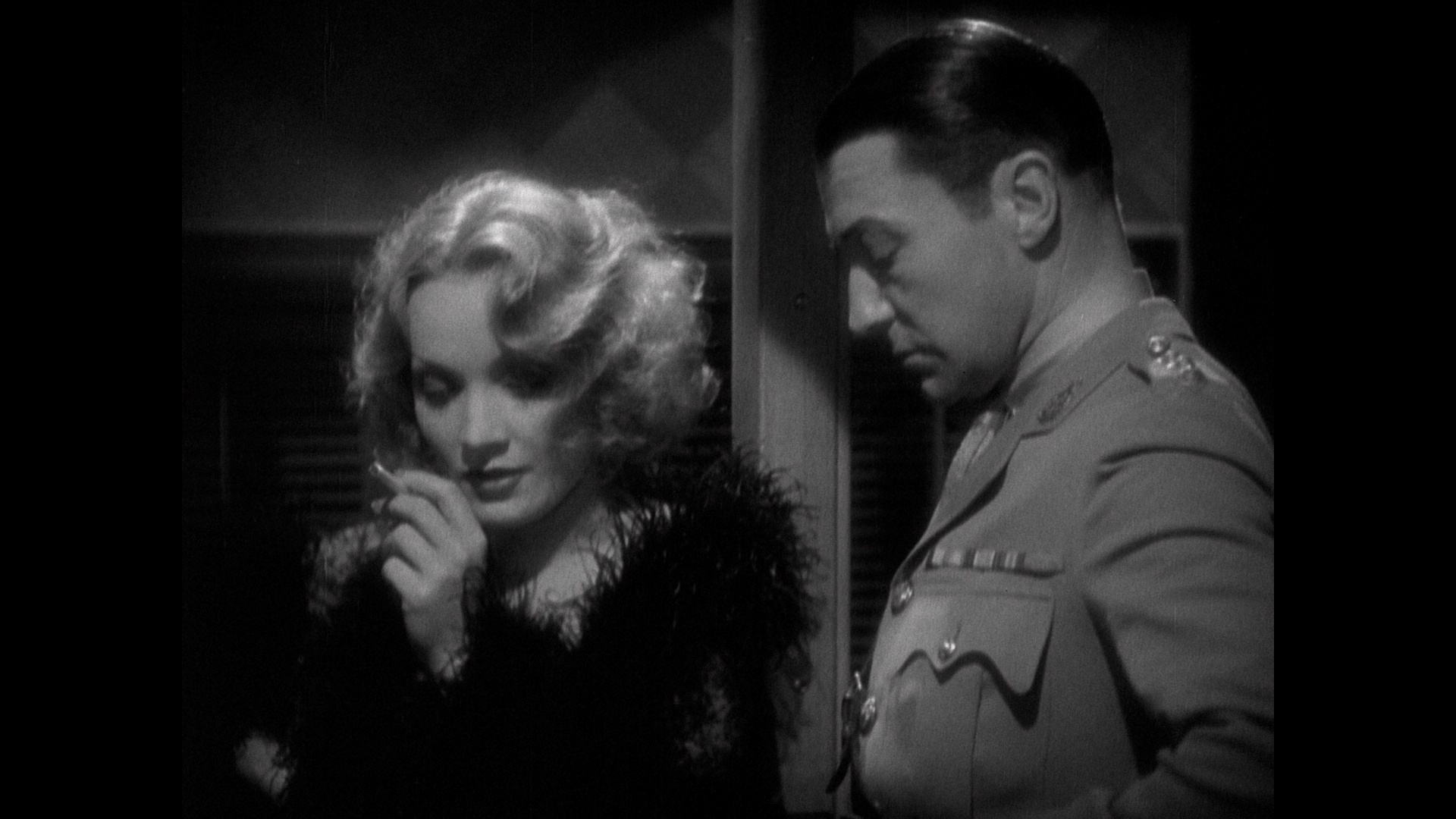 thoughts on her working relationship with von Sternberg (with The Devil Is a Woman singled out as her favorite). That final film also gets only one extra, an audio recording of the deleted Dietrich song, "If It Isn't Pain (Then It Isn't Love" (2m52s); this is the sole remnant of the cuts ordered upon the film, perhaps under the guidance of Ernst Lubitsch. The set also comes with a book featuring essays by critics Imogen Sara Smith, Gary Giddins, and Farran Smith Nehme.
thoughts on her working relationship with von Sternberg (with The Devil Is a Woman singled out as her favorite). That final film also gets only one extra, an audio recording of the deleted Dietrich song, "If It Isn't Pain (Then It Isn't Love" (2m52s); this is the sole remnant of the cuts ordered upon the film, perhaps under the guidance of Ernst Lubitsch. The set also comes with a book featuring essays by critics Imogen Sara Smith, Gary Giddins, and Farran Smith Nehme. 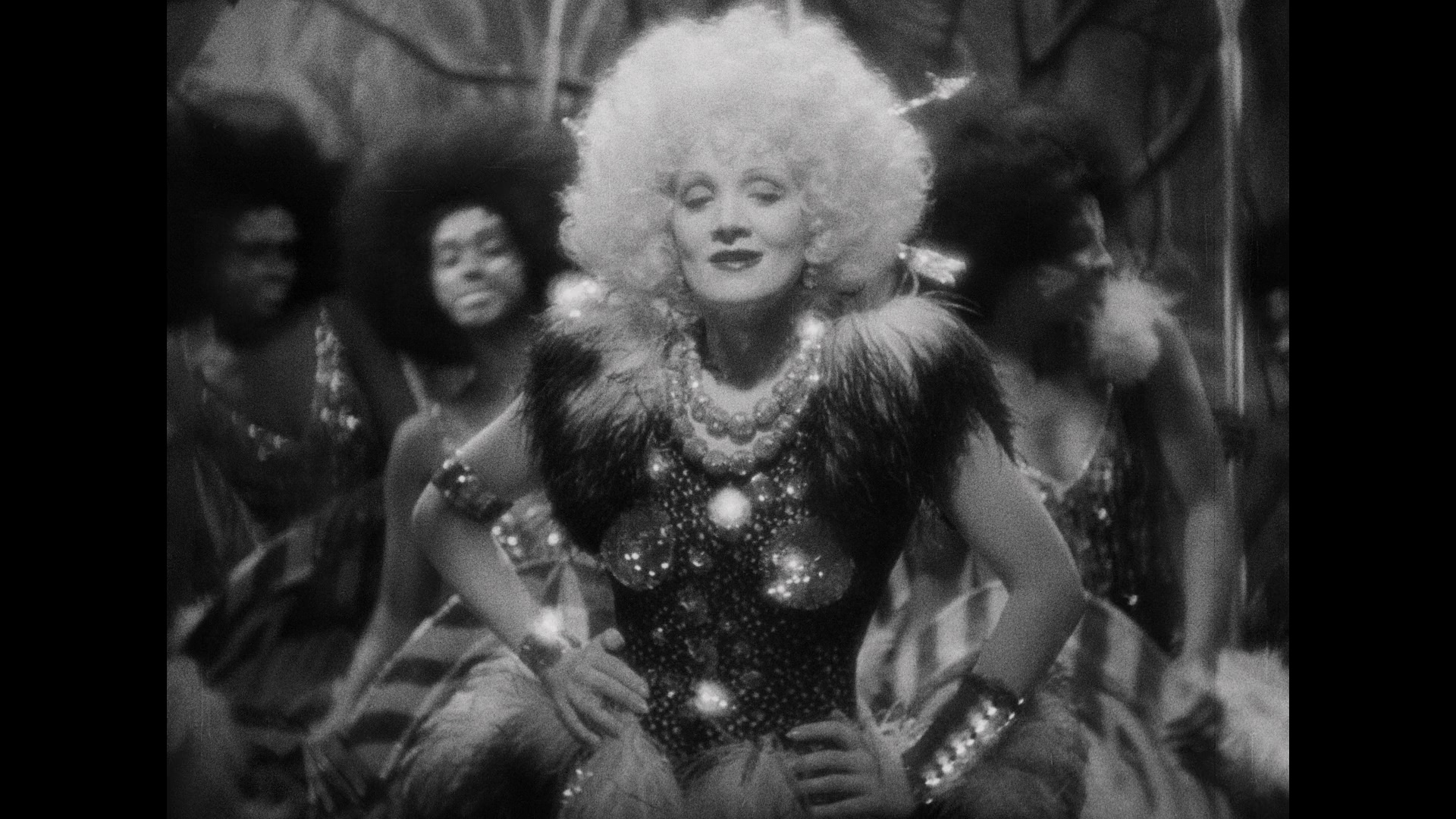 Sternberg (10m36s), about the film's genesis and his father's earlier days in Hollywood on films like the major hit It before the tricky efforts to get Dietrich to drum up interest in Hollywood. He shows up again for "The Art of Josef von Sternberg" (9m22s), an
Sternberg (10m36s), about the film's genesis and his father's earlier days in Hollywood on films like the major hit It before the tricky efforts to get Dietrich to drum up interest in Hollywood. He shows up again for "The Art of Josef von Sternberg" (9m22s), an 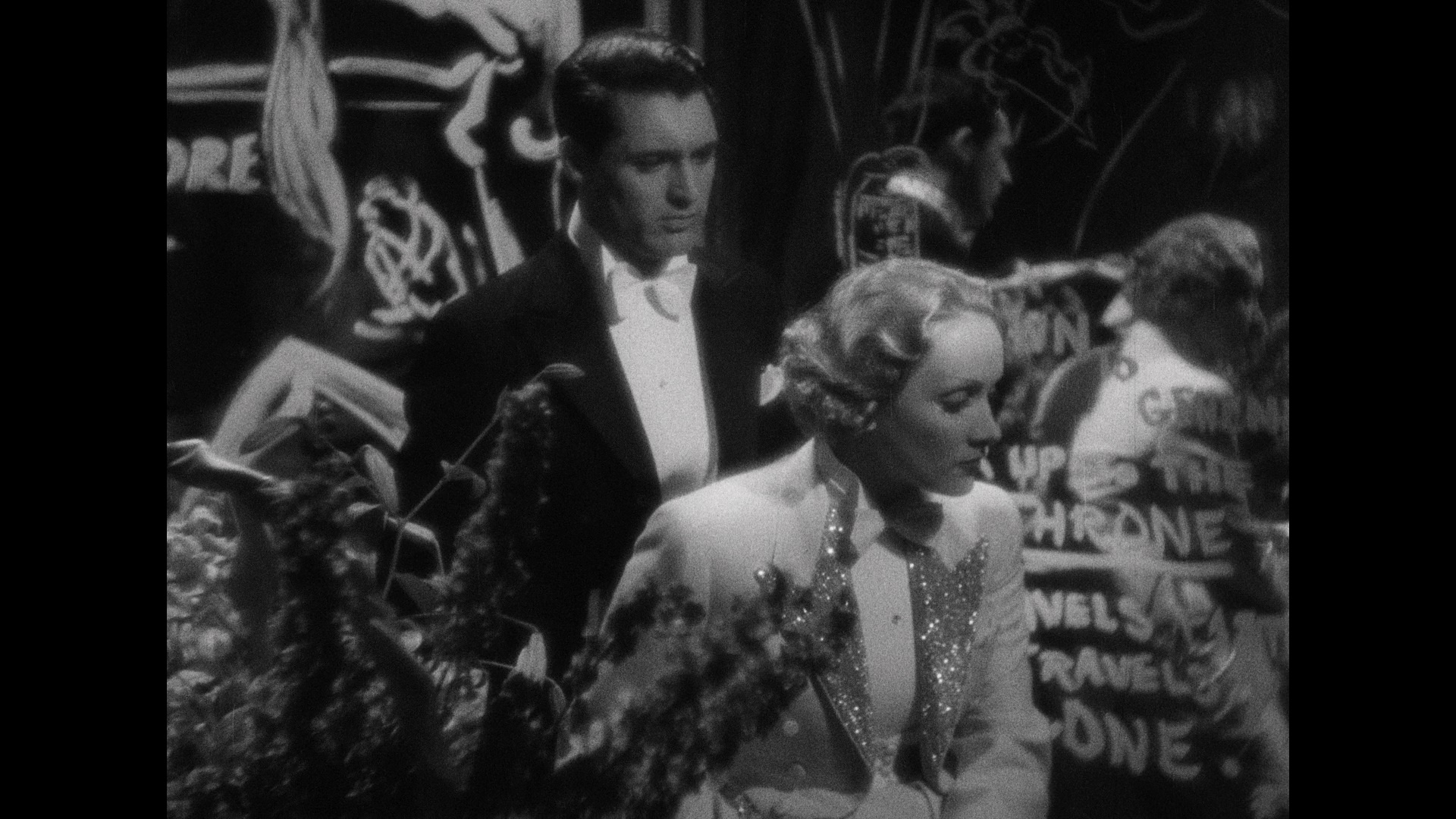 intriguing peek at the director's passion for art and sculpture. The Lux Radio Theatre production is carried over here, followed by a 64-image gallery.
intriguing peek at the director's passion for art and sculpture. The Lux Radio Theatre production is carried over here, followed by a 64-image gallery. 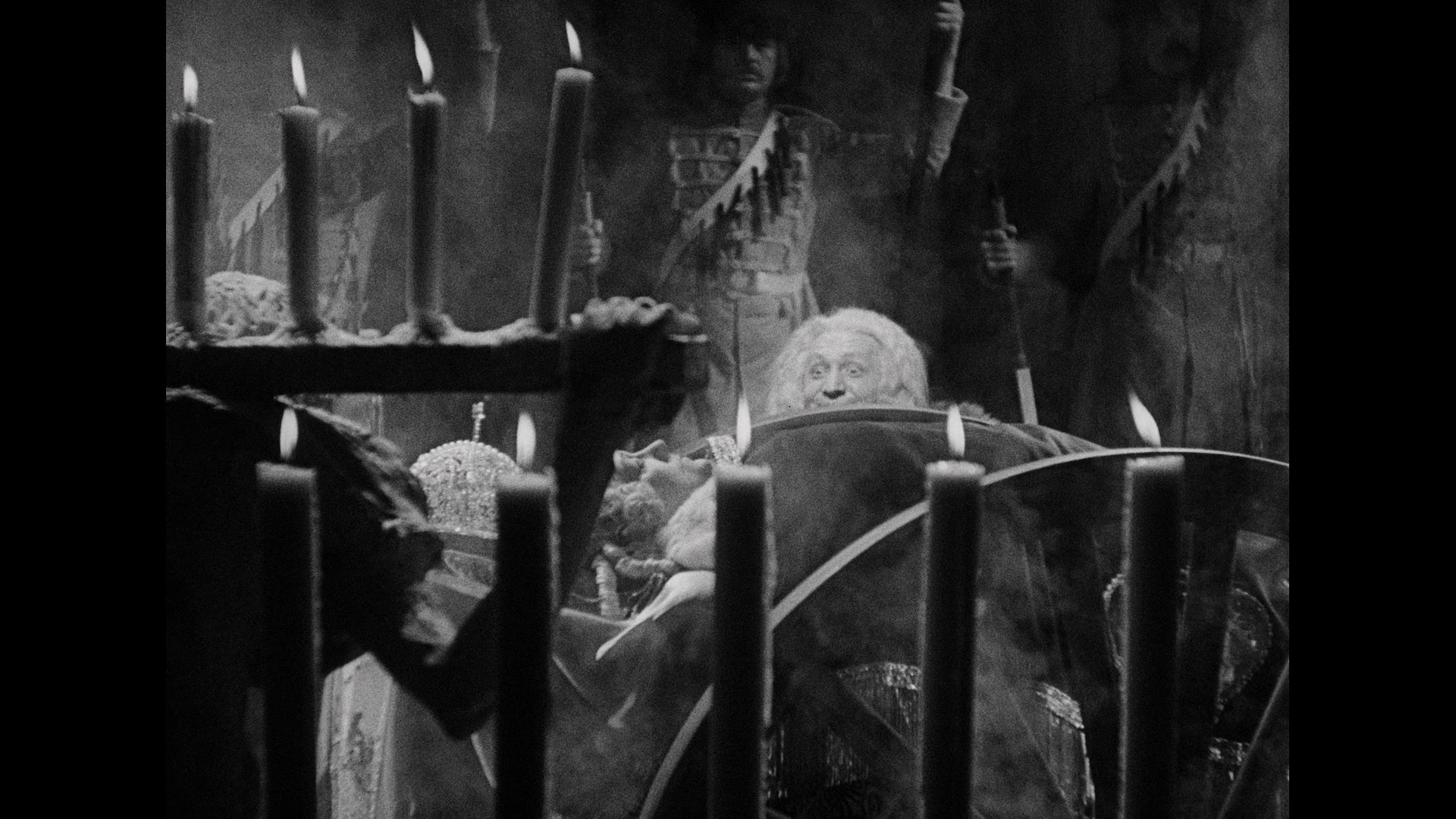 on the transformation motif that runs through the film, touches on a key early scene omitted from many prints, and parses out the complicated attitudes to maternity and marriage versus liberation that shaped the story. After a Nicholas von Sternberg intro (6m35s) about the professional relationships at play in this film,
on the transformation motif that runs through the film, touches on a key early scene omitted from many prints, and parses out the complicated attitudes to maternity and marriage versus liberation that shaped the story. After a Nicholas von Sternberg intro (6m35s) about the professional relationships at play in this film, 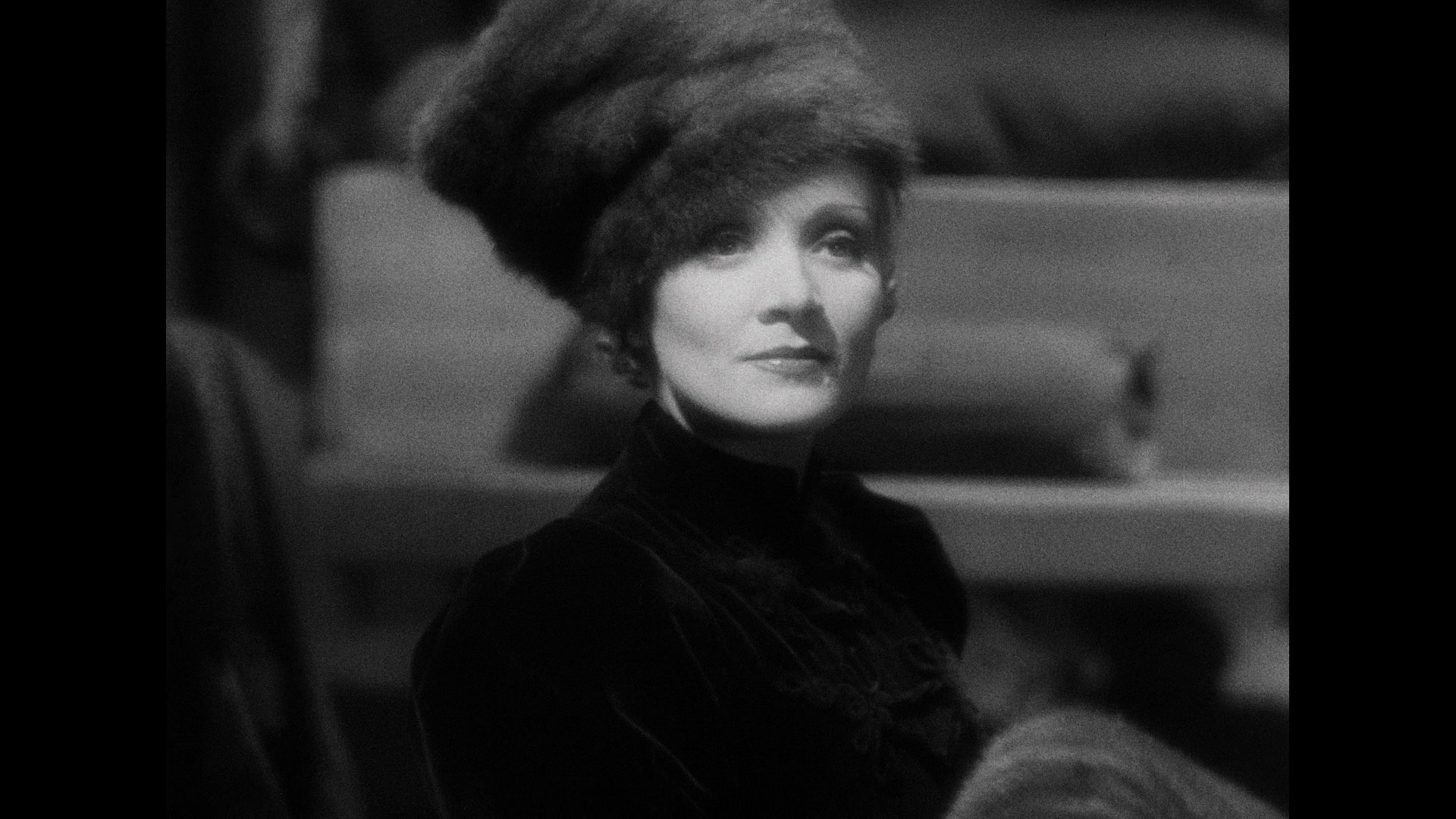 "Dietrich, a Queer Icon" (24m38s) features So Mayer examining the subversive nature of Dietrich's appeal to all genders and sexual orientations through the use of her gender-bending roles and costume choices, with the actress' real-life bisexuality complicating things even further for the studio and the films themselves. A 44-image gallery is also included.
"Dietrich, a Queer Icon" (24m38s) features So Mayer examining the subversive nature of Dietrich's appeal to all genders and sexual orientations through the use of her gender-bending roles and costume choices, with the actress' real-life bisexuality complicating things even further for the studio and the films themselves. A 44-image gallery is also included. 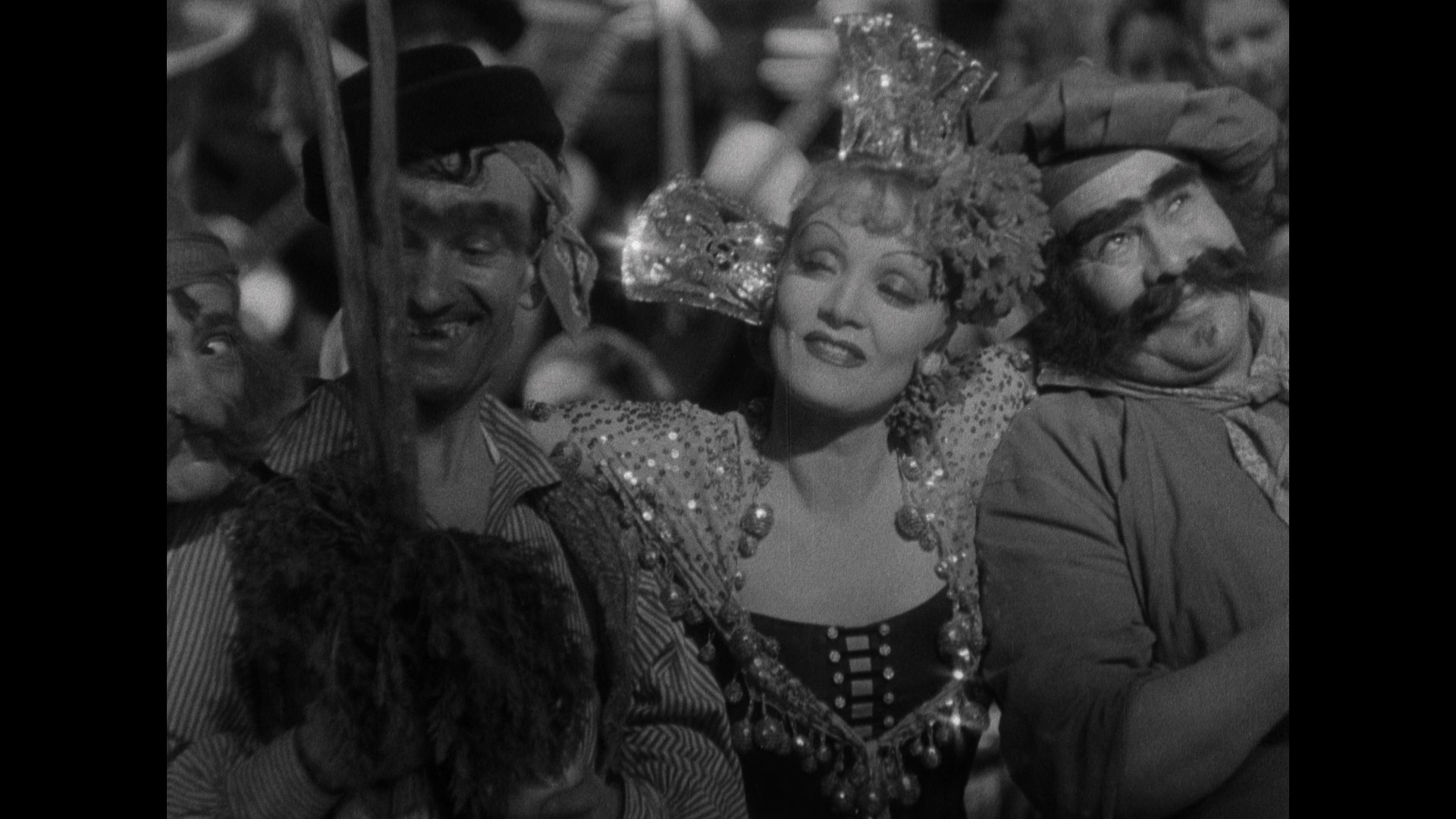 years, with many of her friends, biographers, and colleagues talking about persona and zest for life that informed her even after she decided to step away from the camera to age in private. A 49-image gallery of posters, stills and lobby cards is also included.
years, with many of her friends, biographers, and colleagues talking about persona and zest for life that informed her even after she decided to step away from the camera to age in private. A 49-image gallery of posters, stills and lobby cards is also included. 